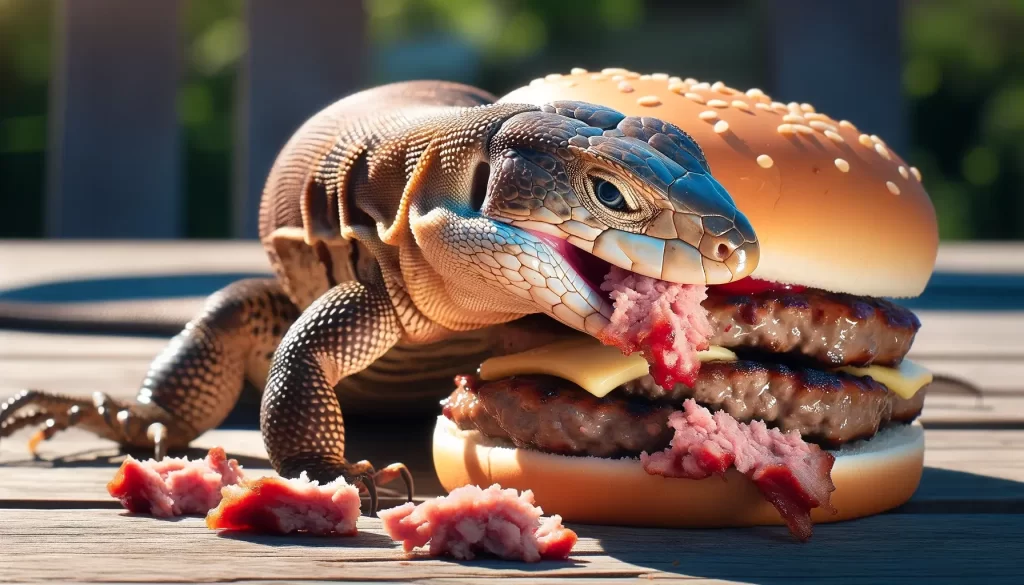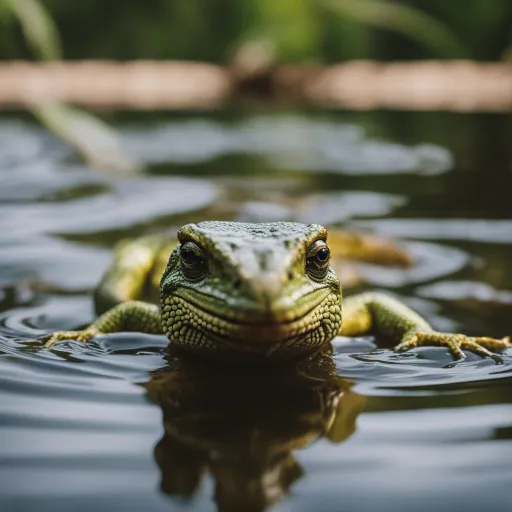Have you ever looked at your pet lizard and wondered if they would enjoy a taste of your juicy hamburger?
As reptile enthusiasts, we’re always seeking ways to bond and share experiences with our scaly companions.
However, when it comes to their diet, it’s essential to consider their specific nutritional needs.
Lizards generally should not eat hamburger meat as it does not align with their natural dietary needs and may lead to health issues. Hamburger meat is high in fat and lacks the calcium-to-phosphorus ratio required for a lizard’s health, potentially causing nutritional imbalances and obesity.
In this article, we will delve into the world of reptile nutrition and explore whether lizards can safely indulge in the occasional hamburger treat.
Key Takeaways:
- Lizards have specific dietary needs that must be met for their health and well-being.
- Feeding hamburger to lizards raises concerns due to the potential risks and health implications.
- Understanding the natural diet of lizards and providing suitable alternatives is crucial for their nutrition.
- Consulting with a reptile veterinarian can provide personalized advice on your lizard’s nutritional needs.
- Crafting a well-balanced nutritional plan and monitoring its effects is essential for your pet lizard’s overall well-being.
Understanding Lizard Dietary Needs
Lizards have specific dietary needs that are vital for their health and well-being. In order to properly care for our lizard companions, it is crucial to understand their natural diet and the essential nutrients they require.
Natural Diet of Lizards
Lizards have evolved to consume a variety of foods in the wild. Their natural diet typically consists of small insects, spiders, worms, and even small vertebrates.
Some lizards are herbivorous, feeding on leaves, fruits, and flowers. It’s important to note that different species of lizards have different dietary preferences and requirements.
Therefore, it’s necessary to research and provide a diet that closely mimics their natural food sources.
Essential Nutrients for Lizards
Just like any other living creature, lizards require a range of essential nutrients to support their overall health and well-being.
These nutrients include vitamins, minerals, proteins, and fats. Vitamins, such as vitamin D3, are essential for proper bone development and metabolic functions.
Minerals like calcium and phosphorus are crucial for maintaining strong bones and teeth.
Proteins, obtained from insects or plant-based sources, are necessary for muscle growth and repair. Fats provide energy and help with nutrient absorption.
The Concerns with Feeding Hamburger to Lizards
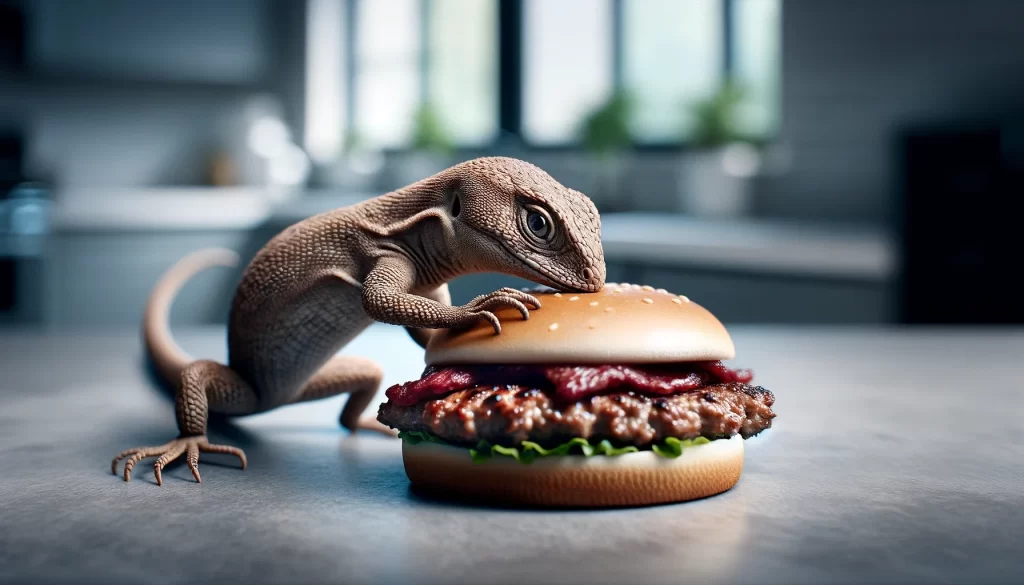
When it comes to our scaly companions, feeding them hamburger meat can raise some concerns.
While hamburger may be a common food item for humans, it may not be the best choice for our lizard friends.
Let’s explore the nutritional composition of hamburger meat and the potential risks associated with processed and cooked foods in a lizard’s diet.
Nutritional Composition of Hamburger Meat
Hamburger meat typically consists of ground beef, which is high in protein and fat content.
While these macronutrients are essential for the human diet, a lizard’s nutritional needs are quite different.
Lizards require a balanced combination of various nutrients such as vitamins, minerals, and proteins to thrive.
Risks of Processed and Cooked Foods
One of the main concerns with feeding hamburger to lizards is the potential risks associated with processed and cooked foods.
Processed foods often contain additives, preservatives, and high levels of sodium, which can be harmful to lizards.
Additionally, cooking meat can alter its nutritional value and may result in the loss of essential nutrients that lizards need for their overall health.
It’s important to note that lizards have specific dietary requirements that are best met with a well-rounded and species-appropriate diet.
Feeding them a diet consisting primarily of hamburger meat may lead to nutritional imbalances and health issues over time.
Health Implications of Hamburger in Lizard Diets
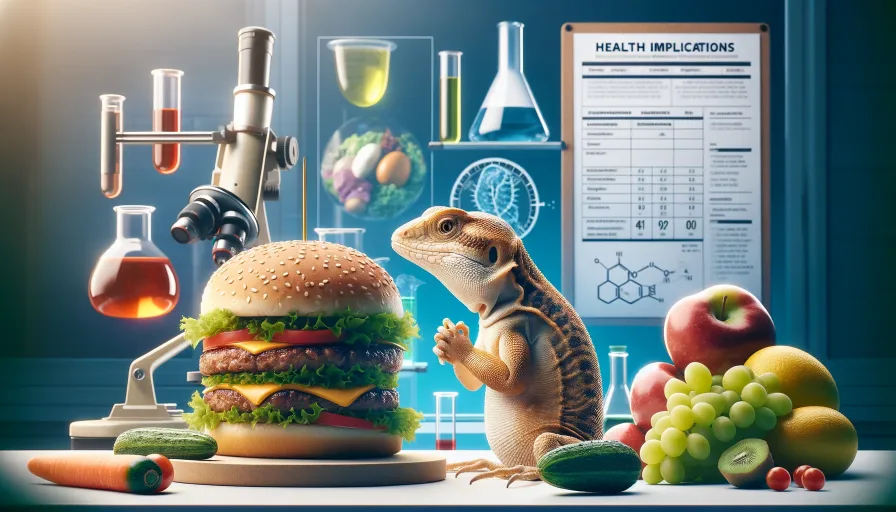
Feeding hamburger to lizards can have significant health implications. The digestive system of lizards is not designed to process meat-based diets, especially processed hamburger meat.
When lizards consume hamburger, they may experience various digestive issues that can negatively impact their overall health and well-being.
Digestive Issues
Lizards have complex digestive systems that are adapted to their natural diet, which primarily consists of insects and plant matter.
When hamburger meat is introduced into their diet, it can cause digestive distress, including:
- Constipation
- Diarrhea
- Bloating
- Gastrointestinal discomfort
These digestive issues can be quite discomforting for lizards and may lead to complications if not addressed promptly.
It is important to note that the lizards’ digestive systems are not equipped to break down the specific proteins and fats found in hamburger meat, resulting in these adverse effects.
Nutritional Imbalances
In addition to digestive issues, feeding hamburger to lizards can also lead to nutritional imbalances.
Lizards require a balanced diet rich in essential nutrients to maintain optimal health. However, hamburger meat does not provide the necessary nutritional profile that lizards need.
While hamburger meat contains protein, it lacks other vital nutrients that lizards require, such as vitamins and minerals.
Over time, a diet centered around hamburger meat can lead to deficiencies in essential nutrients, contributing to weakened immune systems, impaired growth, and overall poor health in lizards.
It is crucial to prioritize the health and well-being of your pet lizard by providing them with a diet that meets their specific nutritional needs.
By avoiding hamburger meat and opting for suitable alternatives, you can help prevent digestive issues and ensure your lizard receives the essential nutrients required for their overall health and vitality.
Safer Dietary Alternatives for Lizards
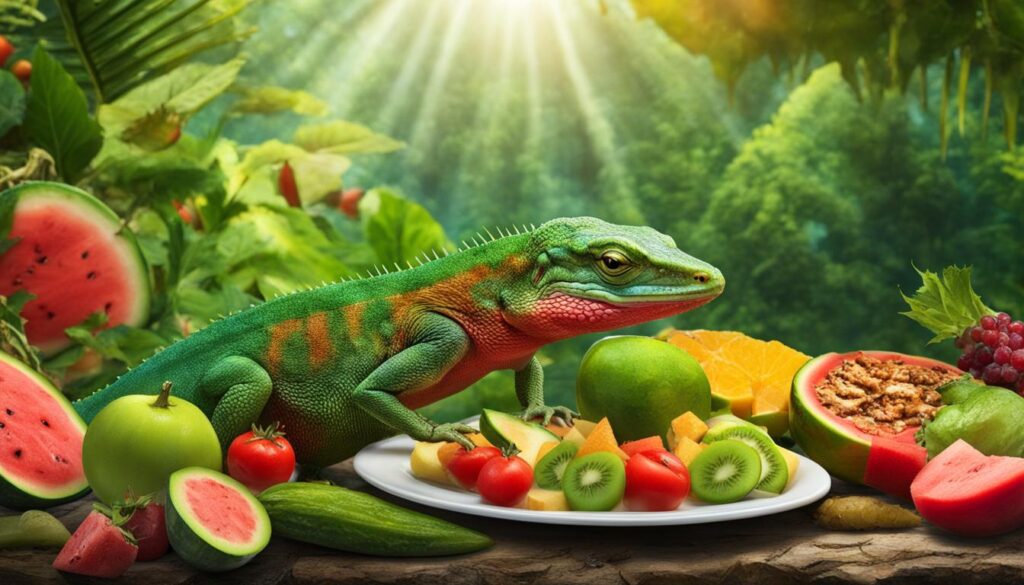
When it comes to providing a nutritious diet for your lizards, there are safer alternatives to hamburger meat that better meet their nutritional needs.
By considering suitable protein sources and balancing their diet, you can ensure the optimal health of your reptilian friends.
Suitable Protein Sources
Lizards require a source of protein to support their growth and overall well-being. Instead of hamburger meat, which may pose risks, consider incorporating other protein-rich options into their diet.
Insects such as crickets, mealworms, and waxworms are excellent choices, as they closely mimic the natural prey of lizards in the wild.
Additionally, certain plant-based proteins like tofu or cooked legumes can be incorporated to provide variety and balance to their diet.
Balancing the Lizard Diet
One essential aspect of lizard nutrition is the balance of their diet. Alongside protein sources, it is important to provide a variety of vegetables and fruits to ensure they receive the necessary vitamins and minerals.
Leafy greens, such as kale and collard greens, can be included to fulfill their calcium requirements.
Fruits like berries and papaya can serve as occasional treats, providing additional nutrients and enrichment to their diet.
By offering a diverse array of protein sources, vegetables, and fruits, you can create a balanced diet for your lizards.
It is recommended to consult with a reptile veterinarian or herpetologist to determine the specific nutritional needs of your particular lizard species and to ensure you are providing a well-rounded diet.
Expert Guidelines on Feeding Lizards
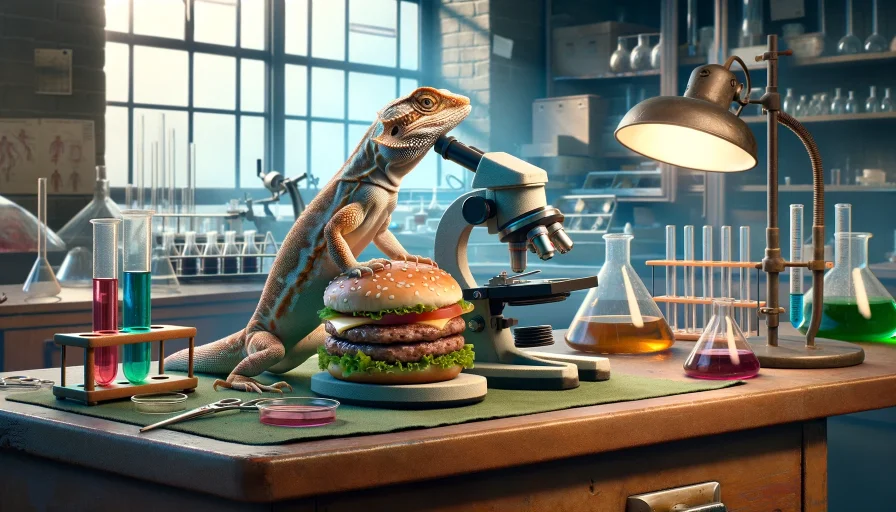
To ensure the well-being of your lizard, it is crucial to follow expert guidelines on feeding.
We understand that providing the right nutrition for your reptile can be a daunting task, but with the help of professionals, you can make informed decisions that promote their optimal health.
One of the key steps in ensuring your lizard’s nutritional needs are met is consulting with a reptile veterinarian.
These specialized professionals have a deep understanding of reptile nutrition and can provide personalized advice tailored to your lizard’s specific requirements.
By seeking their expertise, you can gain valuable insights into the best feeding practices for your beloved pet.
In addition to consulting with a reptile veterinarian, it is essential to follow best practices in reptile nutrition.
These practices involve providing a balanced and varied diet that meets your lizard’s specific dietary needs.
It is important to consider factors such as their age, species, size, and activity level when formulating their diet plan.
By incorporating a variety of suitable protein sources, such as insects and other plant-based proteins, you can ensure that your lizard receives the essential nutrients they require for proper growth and overall well-being.
Additionally, it is important to regularly assess and adjust their diet based on their response and overall health.
Remember, expert guidance and best practices are invaluable resources that can contribute to the long and healthy life of your lizard.
By following these guidelines, you can provide your reptile companion with the nutrition they need to thrive.
Crafting a Nutritional Plan for Your Pet Lizard
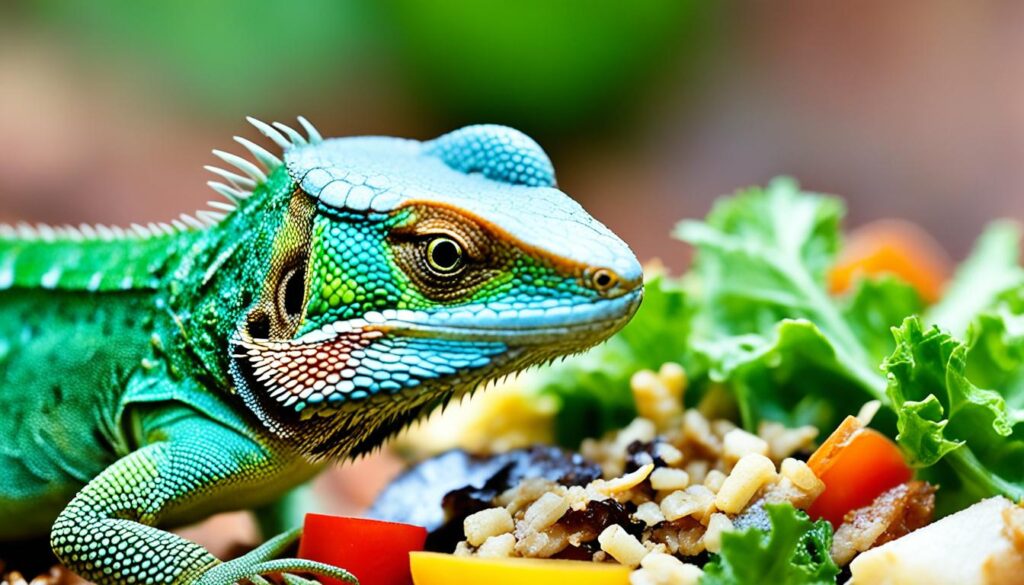
Creating a nutritional plan is essential for the overall health of your pet lizard. By carefully selecting and providing the appropriate food, you can ensure that your lizard receives all the necessary nutrients for optimal well-being.
Planning Your Lizard’s Diet
When crafting a nutritional plan for your pet lizard, it’s important to consider their specific dietary requirements.
Research the natural diet of your lizard species to understand their preferences and nutritional needs.
Include a variety of foods that provide the essential nutrients, such as vitamins, minerals, and proteins.
Start by incorporating a base diet that consists of commercially available reptile food that is appropriate for your lizard species.
This can serve as the foundation for their nutrition. Supplement the base diet with fresh fruits, vegetables, and occasionally, live insects as a source of protein.
It’s important to provide a balanced diet that meets the lizard’s nutritional needs. Avoid relying solely on one food source, as this can lead to nutritional imbalances. Instead, offer a combination of different foods to ensure a diverse and well-rounded diet.
Monitoring Dietary Effects
Regularly monitoring your lizard’s diet is essential for their well-being. Keep track of their weight, behavior, and overall health to ensure that their diet is meeting their nutritional needs.
If you notice any changes in appetite, weight loss, or abnormal behavior, it may indicate that adjustments need to be made to their diet.
Additionally, pay attention to their digestion and bowel movements. If your lizard is experiencing digestive issues or irregularities, it may be a sign that their diet needs to be modified.
Consult with a reptile veterinarian if you have any concerns or questions about your lizard’s diet.
Conclusion
In conclusion, it is not recommended to feed lizards hamburger meat due to the potential risks and health implications involved.
While lizards may technically be able to consume small amounts of hamburger, it does not align with their natural diet and may lead to digestive issues and nutritional imbalances.
Understanding the specific nutritional needs of lizards is crucial for their overall well-being.
Instead of relying on processed and cooked foods like hamburger, it is important to provide lizards with suitable alternatives that fulfill their dietary requirements.
By following expert guidelines and consulting with a reptile veterinarian, you can create a well-balanced nutritional plan for your pet lizard.
This will help ensure they receive the necessary vitamins, minerals, and proteins needed for optimal health and longevity.
Taking these steps will contribute to the long-term nutrition and well-being of your cherished reptilian companion.
Frequently Asked Questions
Q: Can lizards eat ground beef?
A: Lizards can technically eat ground beef, but it is not the best dietary choice. Ground beef is high in fat and lacks the variety of nutrients lizards need from their primarily insect-based diets.
Q: Can lizards eat cooked beef?
A: Like ground beef, cooked beef can be eaten by lizards, but it should not be a regular part of their diet due to its high fat content and the nutritional imbalances it can cause.
Q: Can a bearded dragon eat raw ground beef?
A: Feeding raw ground beef to a bearded dragon is not recommended due to the risk of nutritional deficiencies and the potential for bacterial contamination.
Q: Can a bearded dragon eat cooked beef?
A: While bearded dragons can consume small amounts of cooked beef as a treat, it should not constitute a significant portion of their diet, as it does not provide the balanced nutrition they require.
Q: Can a bearded dragon eat cooked turkey?
A: Cooked turkey can be offered to a bearded dragon in very small amounts as an occasional treat. However, their diet should primarily consist of insects and vegetables to ensure they receive balanced nutrition.
Q: Can lizards eat meat?
A: Some lizards can eat meat, but their diets should mainly include insects or specific plant-based foods depending on the species. Meat can be too high in fat and does not offer a complete nutritional profile for lizards.
Q: Can reptiles eat raw meat?
A: While some reptiles can consume raw meat, it is important to be cautious about bacterial contamination and nutritional balance. It’s best to consult with a veterinarian to understand the dietary needs of your specific reptile.
Q: What is the most terrifying yōkai?
A: Opinions vary, but one frequently mentioned terrifying yōkai is the Gashadokuro, a giant skeleton spirit that roams the night, preying on humans and is known for its immense size and invincibility.
Q: Is kitsune a yōkai?
A: Yes, kitsune are considered yōkai in Japanese folklore. These fox spirits are known for their intelligence and magical abilities, including the power to shape-shift, and they play a variety of roles, from guardians to tricksters.


